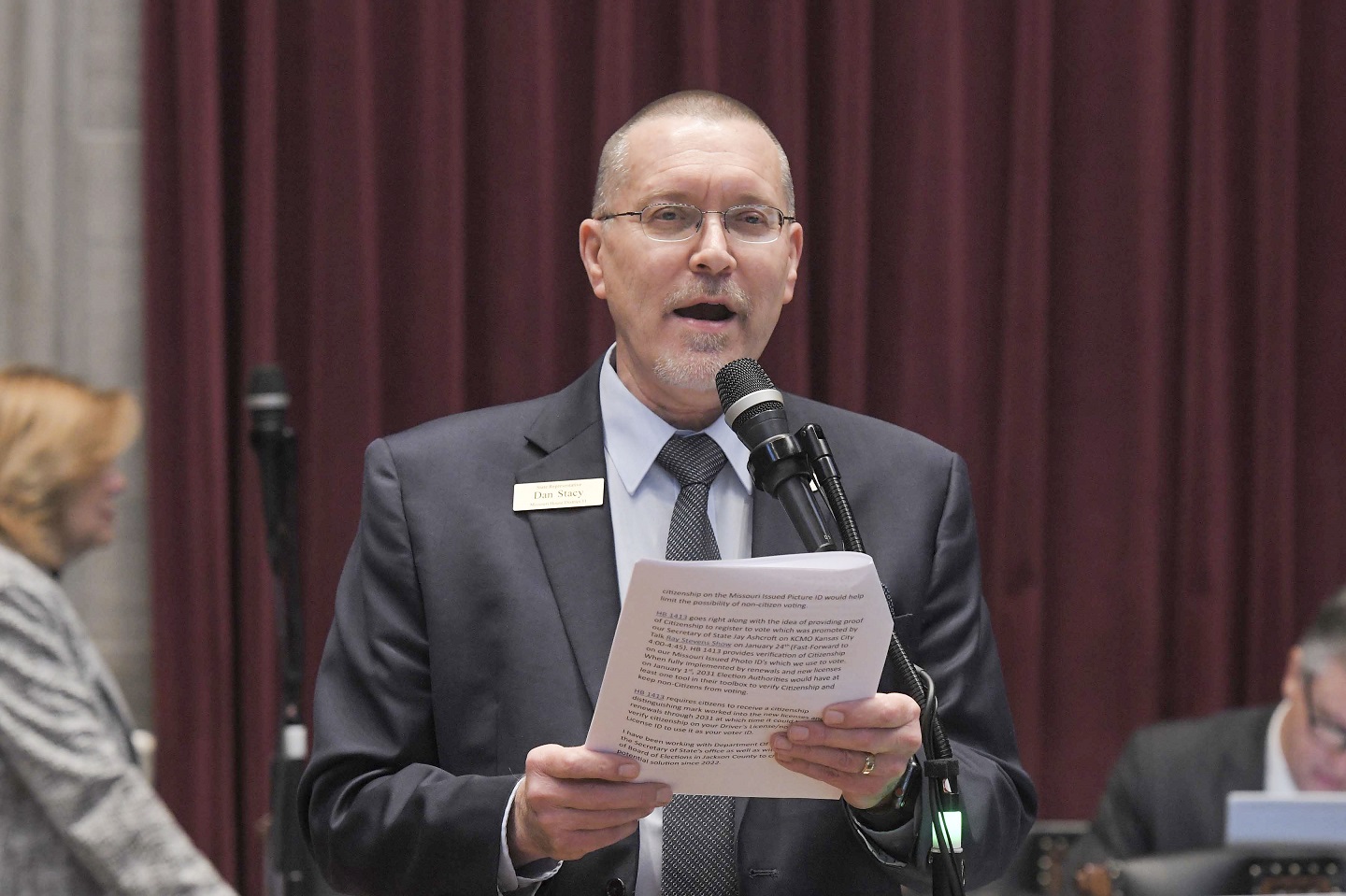Representative Dan Stacy (R-Blue Springs) addressed his colleagues as his final regular session in the House drew to a close, on May 17.
Tag: Dan Stacy
House answers Jackson Countians’ call to elect their assessor
Jackson County residents are angry and frustrated by skyrocketing property tax bills, and the Missouri House has responded, voting toward a restoration of accountability to the office of the county’s assessor.

Jackson County, since a voter-approved measure was passed more than a decade ago, is the only charter county in the state whose assessor is appointed rather than elected. The County’s assessments have been the subject of criticism and anger for months, as property values have increased by about 40-percent since the last assessments were done in 2021. The situation has earned criticism from the state auditor and is the subject of a lawsuit filed by the attorney general.
The House last week approved putting to voters a measure to reverse their earlier decision. HJRs 68 & 79 propose an amendment to Missouri’s Constitution to restore the requirement that Jackson County’s assessor be elected.

It is proposed by Blue Springs Republican Dan Stacy.
“In 2023 Jackson County had over 50,000 appeals of real estate assessment value. Actually, 54,539 appeals. That’s almost one out of every five parcels filed an appeal in Jackson County,” Stacy told his colleagues.
Representative Robert Sauls (D-Independence), who like Stacy, represents a portion of Jackson County, said idealistically he would prefer not to have the entire state voting on an issue specific to Jackson County, but he supported these Resolutions.
“We have got a situation where property tax has become extremely high and people are asking for help,” said Sauls.
Another Jackson County representative, Ingrid Burnett (D-Kansas City), was among the few who voted against the measures.
“Our Jackson County Assessor, current assessor, was handed a mess. It was a mess, the way that the county personal property taxes were being assessed,” said Burnett. “For this body to decide that the rest of the state should decide how Jackson County manages their personal property taxes is just bad policy.”
In response, Stacy reminded his colleagues, “Just keep in mind that 97-percent of Jackson County residents, when polled, said they want an elected assessor. I ask my fellow legislators to support House Joint Resolutions 68 and 79 to give the citizens of Jackson County the same privilege that every other charter county and all smaller counties have in Missouri: an elected tax assessor.”
The House voted 116-10 to advance the measure. It now goes to the Senate. If approved there, it would go to voters on a statewide ballot.
Missouri House sends prescription drug monitoring proposal to the Senate
The Missouri House has voted to create a statewide monitoring program for drug prescriptions. Backers hope such a law would combat the abuse of prescription drugs and help prevent conflicts between medications. Opponents say it would violate Missourians’ constitutional right to privacy.

House Bill 188 would create an online database that physicians and pharmacists could use to track pill purchases and pharmacy visits. Missouri is the only state in the U.S. without such a system, statewide. A program launched in the St. Louis region several years ago now covers 67 of the state’s 114 counties, encompassing about 87-percent of its population.
The bill cleared the House 103-53. Republicans who opposed it were very vocal about fears that the program would create a government database that would jeopardize Missourians’ medical information.
Backers say no other PDMP database has ever been successfully hacked and say this would fall under Health Insurance Portability and Accountability Act privacy protections. Blue Springs Republican Dan Stacy remained critical, and said that to say databases won’t get hacked is, “probably somewhat naïve.”
Eureka Republican Dottie Bailey said she remembered being a concealed carry permit holder when, under the administration of Governor Jay Nixon, information about those permit holders was shared with the Department of Homeland Security.
“Nothing has happened to that administration since that occurred other than my name is with the federal government as a firearms owner, or permitted, so right now, not a big deal, right? But what happens when another administration gets in that wants to weaponize those databases? And this is where I worry, this is where my constituents worry,” said Bailey. “This bill is very difficult because yes, something needs to be done, but an overwhelming, sweeping government program has never, ever done what we think it’s going to do and then we usually end up regretting it.”
Proponents said concerns over privacy were being overblown, and paled in comparison to the bill’s goal of saving lives by fighting prescription drug abuse.
“Hacking is a real concern, I know, for all of us,” said Representative Sheila Solon (R-St. Joseph), “however we can’t let that worry consume us or we would never use a credit card to go to a restaurant or to go shopping or go to the gas station. We’d never use a credit card or do any shopping online.”
Other lawmakers expressed frustration that all attempts to amend the bill were rejected. Among those amendments were proposals to require physicians and pharmacists to participate in the database – the bill would make that optional – and to create penalties for failure to participate.

“No penalties; no requirement to participate; no protection for chronic pain patients, and that is unfathomable. I just don’t get it, why we are punishing those who actually need the help,” said Ash Grove Republican Mike Moon.
Bill sponsor Holly Rehder (R-Sikeston) responded to those critics, saying, “I disagree with those who said that we didn’t do our job because this bill hasn’t been amended. Mr. Speaker this bill has been massaged for years on this floor. We started this year with where we had left off with the things we had agreed with. The ones who wanted to amend it wanted to kill it.”
Rehder, who has proposed PDMP legislation for several consecutive sessions, told opponents that one way or another Missouri will have a monitoring program.
HB 188 now goes to the Senate, where past years’ versions have run into opposition and stalled out. While the senator who led that opposition is no longer in that chamber due to term limits, last week the Senate version of Rehder’s bill stalled in a tie committee vote.
Rehder and other backers note that all members of that committee were present for the vote, and she believes that outcome isn’t representative of the chances of passing a PDMP bill this year.